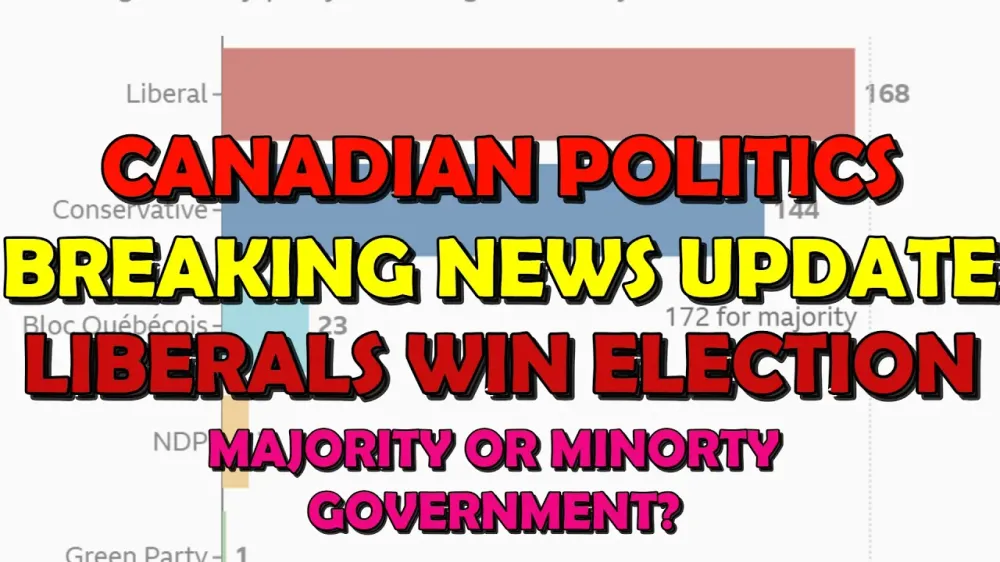BREAKING NEWS: Canada Elects a Liberal Government, Trump & Trudeau Hand Carney a Win
Table of Contents 📖
"This is a problem with first-past-the-post, is that if you are... Your votes effectively mean nothing if you live in a place where... this is the same for me here in my constituency in the UK. There's almost no point in me going out and voting. And I'm so politically active, it's quite depressing... I'm disenfranchised really by the voting system."
Hello Team
🎦 00:00.000-00:23.520
Jonathan welcomes viewers to an ATP Geopolitics breaking news video focusing on the Canadian election results. He notes he is wearing Canadian apparel in solidarity.
Return to top⤴️
Overview of Canadian Political Parties and Landscape
🎦 00:23.520-01:35.480
* Jonathan provides a brief overview of Canadian politics, acknowledging he is not an expert and inviting corrections.
- He characterises Canada as broadly a centre-left country where the left-wing vote tends to be split more than the right.
- Main parties mentioned:
- Liberal Party (Centre-left, incumbent)
- Conservative Party (Centre-right/Right)
- Bloc Québécois (Focuses on Quebec sovereignty/identity)
- NDP (New Democratic Party - Progressive, left of Liberals)
- Green Party (Progressive)
- People's Party (Populist right, less prominent in this election than 2021).
2021 Canadian Election Results Recap & First-Past-The-Post Critique
🎦 01:35.480-03:26.440
* Jonathan recalls the 2021 election results as context: Liberals under Justin Trudeau won 155/157 seats (sources differ slightly in transcript) with 33.1% of the vote, while Conservatives won 119/121 seats despite having a higher vote share (34%).
- He criticises the First-Past-The-Post (FPTP) electoral system used in Canada (and the UK, US), arguing it's poor for democratic representation.
- FPTP can lead to a disconnect between the popular vote percentage and the number of seats won, as votes can be highly concentrated in certain areas (winning those seats overwhelmingly) but less spread out nationally.
- He contrasts this with Australia's system, which he views as better.
2025 Canadian Election Preliminary Results
🎦 03:26.440-03:42.160, 05:24.180-05:46.860, 21:05.736-21:34.776
* Results from the 2025 election (as they stand, not fully finalised):
- Liberals: 168 seats (155 elected + 13 leading, per CBC tracker)
- Conservatives: 144 seats (elected + leading)
- Bloc Québécois: 23 seats (down from 32 in 2021)
- NDP: 7 seats (down from 24/25 in 2021)
- Green Party: 1 seat (down from 2 in 2021)
- Jonathan notes the results confirm Canada's centre-left leaning, as Conservatives typically win only when the left vote is significantly split.
- Return to top
- ⤴️
Comparison of Party Performance: 2021 vs 2025
🎦 03:42.520-04:09.960, 05:00.600-05:24.180, 07:27.625-08:00.525, 16:54.790-18:17.450
* Both the Liberals and Conservatives improved their seat counts compared to 2021.
- Conservatives gained significantly, taking votes from the collapsing People's Party (whose vote share dropped from approx. 5% in 2021 to 0.7% in 2025).
- The NDP under Jagmeet Singh "fell apart," losing many seats primarily to the Liberals.
- Bloc Québécois lost 9 seats.
- Greens lost 1 seat.
- Overall, there was a coalescing of votes around the two main parties, with smaller parties losing ground significantly.
Analysis of Vote Shifts and Demographics
🎦 04:10.340-05:00.600, 08:00.565-08:26.345, 18:17.670-18:52.511
* Conservatives likely absorbed most of the former People's Party vote.
- Liberals likely benefited most from the decline of the NDP, Bloc Québécois, and Greens.
- Jonathan speculates Conservatives may have also gained some support from younger voters pushing back against long-term Liberal rule.
- An interesting demographic shift noted: older people leaning more Liberal, while younger voters were more pluralistic.
- He suggests a possible move away from identitarian politics in this election, which he views positively.
Impact of Justin Trudeau's Resignation and Mark Carney's Rise
🎦 08:26.345-10:26.705
* A key factor in the shifting polls was Justin Trudeau stepping down as Liberal leader. He had become unpopular after a long time in power and was perceived by some as "too woke".
- Initially, polls favoured Conservative leader Pierre Poilievre over Trudeau.
- Mark Carney, former Governor of the Bank of England and Bank of Canada, replaced Trudeau after winning the Liberal leadership contest against Chrystia Freeland.
- Carney, perceived as a competent, sensible, "quietly competent" technocrat, proved more appealing to the electorate than the Trudeau vs. Poilievre choice.
- Carney's emergence began the Liberal recovery in the polls.
Donald Trump's Influence on the Election
🎦 10:27.025-11:46.245
* The second major factor boosting the Liberals was Donald Trump's attacks on Canada.
- Trump's rhetoric about Canada becoming the "51st state," trade tariffs, etc., provoked a strong "rally around the flag" effect.
- This effect naturally benefited the incumbent governing party (Liberals), now led by Carney.
- Most Canadians reacted negatively to Trump's comments, increasing support for the Liberals and hurting Poilievre, who was previously seen as somewhat "MAGA-ish".
Conservative Party Pivot in Response to Trump
🎦 11:46.325-12:52.845
* Trump's anti-Canada rhetoric forced Conservative figures like Pierre Poilievre, Doug Ford (Ontario Premier), and even the very pro-Trump Danielle Smith (Alberta Premier), to publicly condemn his statements.
- This was awkward for them given their previous alignment/sympathies.
- Jonathan shows a map highlighting Conservative strongholds like Alberta under Danielle Smith remaining solidly blue.
- The pivot likely helped Conservatives increase their seats but ultimately favoured the Liberals more.
Tactical Voting and NDP's Decline
🎦 13:08.191-13:22.330
* Jonathan suggests tactical voting may explain the NDP's severe losses ("absolutely hammered").
- Voters who might typically support the NDP may have shifted to the Liberals to prevent a Conservative victory, especially given the political climate influenced by Trump.
Early Election Night Trends and Corrections
🎦 13:22.330-14:48.230
* Early results from Atlantic Canada (e.g., Newfoundland) caused some initial worry for the Liberals, showing unexpected Conservative strength in some ridings where Poilievre had campaigned heavily.
- Betting markets (PolyMarket mentioned) briefly shifted towards a 50-50 chance for Poilievre.
- However, these were low-population ridings, potentially easier to skew. As results came in from higher-population areas, the trend corrected, and Liberal support solidified.
Potential for Minority Government and Past Agreements
🎦 14:48.230-16:25.510
* With 168 seats projected, the Liberals might fall short of the 172 needed for a majority government.
- Jonathan recalls the previous Parliament (post-2021 election) where the Liberals governed with a minority.
- They had a confidence and supply agreement with the NDP (not a formal coalition), where the NDP supported the government on key votes in exchange for policy concessions.
- He compares this to the Conservative-DUP agreement in the UK in the recent past.
Analysis of Vote Share vs Seat Share Discrepancies (FPTP)
🎦 16:54.790-18:06.650, 18:53.851-19:39.296
* Jonathan highlights the distortions caused by First-Past-The-Post (FPTP):
- In 2025, Liberals got 43.5% of the vote and 49.7% of the seats (168/338).
- Conservatives got 41.7% of the vote and 42.6% of the seats (144/338).
- Conservatives saw a larger increase in seats (25) relative to their vote share increase (7.7%) compared to the Liberals (8 seat increase for a 10.9% vote increase).
- The NDP suffered most from FPTP: 6.2% vote share yielded only 2.1% of seats (7/338).
- Greens (1.1% vote, 0.3% seats), People's Party (0.7% vote, 0 seats), and Independents (0.2% vote, 0 seats) received minimal or no representation for their votes.
Jonathan's Critique of First-Past-The-Post
🎦 19:39.736-21:05.736
* Jonathan strongly reiterates his dislike for FPTP.
- He argues it disenfranchises voters in safe seats, where their vote effectively means nothing and will never change the outcome.
- He uses his own UK constituency (very safe Conservative) as a personal example, stating he feels politically disenfranchised despite being politically active.
- He advocates for proportional representation or preferential/ranked-choice voting systems to make votes more meaningful.
Mark Carney's Victory Speech and Future Policy Direction
🎦 21:35.736-22:21.536
* Jonathan notes Mark Carney gave a good victory speech focusing on unity.
- Carney's slogan "build, baby build" suggests a focus on:
- Energy infrastructure
- Housing
- Economy and security
- Seeking trade deals beyond the US.
- The government will face the challenge of engaging with the US under potentially difficult circumstances (Trump factor).
- The final outcome (minority or potentially narrow majority) remains slightly uncertain but looks like a minority.
Summary of Liberal Comeback and Key Factors
🎦 22:21.536-23:22.416
* Jonathan describes the Liberal victory as an "incredible rally" and potentially "one of the most impressive turnarounds in political history," given their poor polling earlier.
- Polls showed Poilievre leading Trudeau, then a crossover occurred after Trudeau resigned and Carney took over, accelerated by Trump's attacks.
- He charts the shift: Trudeau down/Poilievre up -> Trudeau resigns -> Liberals start rising -> Carney takes over/Trump attacks -> Liberals cross over and surge ahead as Conservatives decline relative to them.
- Despite the Liberal win, Conservatives still improved their vote share and seat count compared to 2021.
Potential Fate of Conservative Leader Pierre Poilievre
🎦 23:32.276-24:40.236
* Jonathan mentions reports that Pierre Poilievre might be losing his own riding (constituency), possibly to a Liberal opponent (mentions "Fanjoy" - potentially misheard name/riding).
- He notes the irony if the Conservatives improve overall but their leader loses his seat ("Ouch").
- He describes Poilievre as populist and social media savvy, whose momentum stalled after Trudeau's resignation and Trump's intervention.
Implications of Liberal Win for Ukraine Support
🎦 24:41.036-25:40.616
* Jonathan views the Liberal victory under Mark Carney as positive for Ukraine.
- He believes Carney was the best option for Ukraine among the potential leaders.
- He notes Chrystia Freeland (who ran against Carney for leadership) has a Ukrainian background and might return as Finance Minister or another key role.
- He expects the Liberals to support Ukraine but urges them to increase Canada's defence spending quickly.
Wrap up
🎦 25:40.616-25:55.396
* Jonathan concludes his "waffling stream of consciousness" analysis.
- He invites viewers to correct any errors, reiterating he's not a Canadian electoral expert but offering his take.




